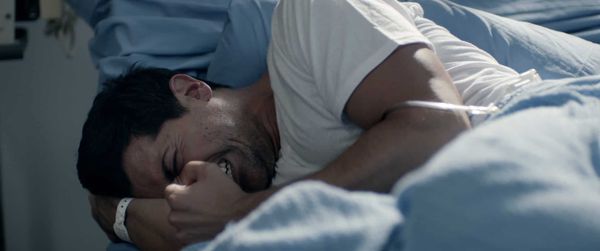Eye For Film >> Movies >> Painkillers (2018) Film Review
Painkillers
Reviewed by: Jennie Kermode

Have you ever been in so much pain that you felt ready to do anything at all to make it stop? It's not uncommon to experience this on an acute basis, say, during childbirth or immediately after breaking a leg. Living with severe chronic pain, however, throws up all kinds of additional problems. It can make it very difficult to sleep, causing a permanent state of exhaustion. It can kill the sex drive and sap so much emotional energy that maintaining close relationships of any kind becomes close to impossible. It contributes to depression, anxiety and other forms of mental illness. For those most profoundly affected it dramatically reduces life expectancy. Curiously, the horror genre has rarely considered it. Sure, it's difficult to talk about long term suffering whilst keeping stories dynamic and characters widely relatable, but the effect is that most films concerned with short term suffering see trivial to those familiar with the horrors of real life.
Not so Painkillers, which makes a bold effort to take on this large and complex subject, not always getting it right but, overall, acquitting itself pretty well. This is primarily due to the presence of Adam Huss as surgeon hero John. Though he's not the strongest actor in the film (Madeline Zima is excellent as wife Chloe, struggling with suffering of her own and trying to cope with being shut out by his; plus there's an impressive turn from young Tate Birchmore as the couple's son), he knows how to play pain like this, something most actors are frankly terrible at. He does so by focusing on the side effects it causes, avoiding sensationalism and keeping tight control of his visible emotions. The transformation when he finds relief is a remarkable thing to watch. That relief, however, comes at a very high cost.

Not since Abel Ferrara's The Addiction has anybody used vampire myths to talk about real world illness in this way, and the shadow of Ferrara's work haunts this film despite its very different style. We are far from the landscape of shadows and alleyways here, where desperation is a middle class affliction. Pale skin, as John's mentor put it, is bad for business. He's Harb (Grant Bowler), a smartly dressed man with an easy patter, adept at winning over those in need. When he learns that John has succumbed to a pain whose cause no-one can pinpoint after a car accident, he steps in with a dubious diagnosis (if it's really a form of post traumatic stress disorder, why does no-one try eye movement desensitisation or cognitive behavioural therapy?) and a ready made sales pitch. Drinking one's own blood, he explains, brings limited relief and is unsustainable. He can provide a ready-made supply of fresh product once a week, no questions asked.
Of course, John asks questions. When the cravings that follow persuade him that he could be a danger to those he loves, he asks a lot of questions and gets himself in deep like any number of middle class heroes confronted by the dynamics of the real world. As well as wrestling with his own impulses, he becomes determined to do what's right.
It's here that the film starts to struggle. It's refreshing to have a chronically ill hero who isn't hopelessly corrupted as a result of his suffering (but isn't saintly and twee either), yet the ease with which John pushes his own feelings aside nice he's decided to try and be a hero isn't wholly convincing. The way other concerns associated with the accident are set aside (despite Zima's best efforts to reclaim them through her acting) is similarly problematic. We don't see much recognition of the fact that if John resolves his immediate problems he is still likely to be left with the lifelong cravings every addict faces. Nevertheless, the film leans towards a narrative that keeps it real and accords John welcome agency in spite of his problems.
The quality of the dialogue doesn't always live up to this. Zima, in particular, struggles with some leaden lines, forced to try and state what we don't see. Writer Giles Daoust seems most at ease with the business language used, and this is complemented by the work of cinematographer Felipe Vara de Rey, who does a good job of making parts of the film look as if they've been lifted straight out of an advert. Vampirism has never been this smoothly pitched at the mainstream. Back in the real world, where it has recently been established that injecting the blood of young mice into older ones reduces signs of ageing, one almost wonders if the film will serve as a test for a new marketing campaign.
Reviewed on: 28 Jan 2019
















